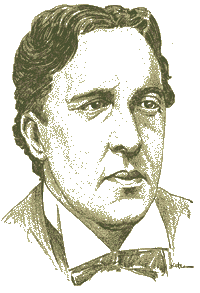 AFTER the first performance of Lady Windermere's Fan, Clemence Scott, veteran nineteenth century critic of London drama, wrote in The Daily Telegraph: "The play is a bad one but it will succeed. No faults of construction, no failure in interest, no feebleness in motive, will weigh in the scale against the insolence of its caricature."
AFTER the first performance of Lady Windermere's Fan, Clemence Scott, veteran nineteenth century critic of London drama, wrote in The Daily Telegraph: "The play is a bad one but it will succeed. No faults of construction, no failure in interest, no feebleness in motive, will weigh in the scale against the insolence of its caricature."
This criticism sums up the spirit of the playwright himself. He thumbed his nose, so to speak, at the world. In his college days he delighted to scorn what were referred to as the "manly sports," thereby earning a reputation for effeminacy. He decorated his rooms with all sorts of "artistic" impedimenta. In fact, his general attitude got him a ducking at Oxford where he went from Trinity College, Dublin.
Oscar Fingall O'Flahertie Wills Wilde was the son of a famous Irish surgeon. His mother was a graceful writer of verse and prose, and it was doubtless to her early influence that Wilde owed his interest in literature. After he left college he became interested in "art for art's sake," and became sufficiently prominent to be invited to lecture in the United States.
Wilde had written considerable verse, fairy stories, and other prose, and had made some attempt at drama before the successful production of Lady Windermere's Fan in 1892. This was followed by A Woman of No Importance (1893), An Ideal Husband (1895), and The Importance of Being Earnest (also 1895). This was his last play and the only one that received favorable notice from the press.
It was shortly after the production of this play that Wilde brought the notorious libel suit against the Marquis of Queensbury. The revelations of the trial were such that Wilde was sentenced to two years' imprisonment with hard labor. Out of this experience came his famous Ballad of Reading Gaol. He came out of prison, however, broken in body and spirit. For the brief remainder of his life he lived on the continent under the name of "Sebastian Melmoth."
Wilde's play, Salome, written in French in 1893 for Sarah Bernhardt, received a single performance in Paris in 1904, and is today much better known through Richard Strauss' operetta, for which it served as the libretto. Wilde's plays, whether good or bad dramatically, are gifted with theatrical effectiveness and a brilliance of wit and epigram that easily account for whatever success they enjoyed.
Purchase Plays by Oscar Wilde
Search eBay! for Oscar Wilde collectibles